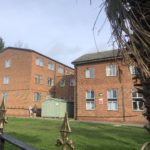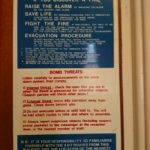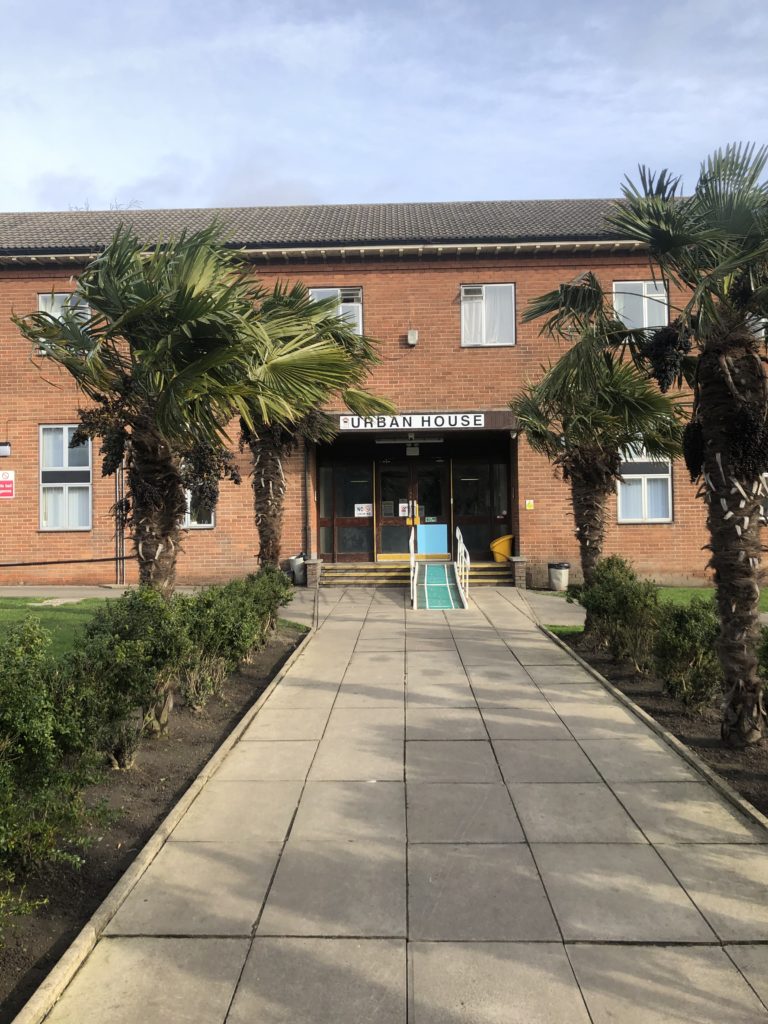‘We could take this place, which is like a prison, for three or four weeks but not for months and months’ – Barry, a businessman from the Middle East
I was sitting in a café in the centre of Wakefield having a discussion (through an interpreter) over coffee, with a group of professional workers from the Middle East who had claimed asylum in the UK. They were cataloguing, sometimes in perfect English, the grim reality of the UK asylum system and their everyday experience of an asylum hostel just ten minutes’ walk away.
 Over the past two weeks I have had similar discussions, face to face or by phone/text, with twelve residents of the Urban House Initial Accommodation Centre, sited on Love Lane, under the walls of Wakefield high security prison near the city centre.
Over the past two weeks I have had similar discussions, face to face or by phone/text, with twelve residents of the Urban House Initial Accommodation Centre, sited on Love Lane, under the walls of Wakefield high security prison near the city centre.
What are IACs?
Initial Accommodation Centres (IACs) or hostels, sometimes called reception centres, are situated in ‘dispersal areas’ where shared houses and flats are provided for asylum seekers. There are IACs in Belfast, Glasgow, Liverpool, Birmingham, London, Derby, Cardiff and Wakefield. Wakefield’s Urban House is run by the Urban Housing company, subcontracting from Mears. People wait in IACs or in overspill hotels to be ‘dispersed’ to asylum housing.
Through the testimony of the twelve residents it is clear that conditions in the Wakefield centre have continued to deteriorate since autumn 2019, when Mears and Migrant Help began delivering the AASC (Asylum Accommodation and Support Contracts) and AIRE (Advice, Issue Reporting and Eligibility) contracts respectively.
The food is horrible
‘The food is horrible, the same breakfast every single day. Porridge often burnt. Soft white bread, no toast, A little butter and jam. There is no special food for children.’ Anne, nutritionist from the Middle East

Anne was one of the residents of Urban House at the café discussion, as was Kathy, a young teacher from the Middle East. Kathy told me, ‘I have been in Urban House for over a hundred days, since last October. The food is the same every single day and very poor. Children as young as two and four years have to eat the same food as adults. They have to eat very spicy food which they often refuse.’

June, a young businesswoman, said ‘If you want a snack between 6.30 pm at the end of dinner and 7 am the next day there is nothing. When mothers ask for snacks for their children, they are given half a tiny sandwich for each child.’
The provisions on food services in the Mears Group contract with the Home Office are specific and have been totally ignored in Urban House.
‘2.3.6 If ‘full board’ Accommodation is supplied by the Provider for any Service User, the full board food service shall comprise complete and adequate provisions for pregnant women, nursing mothers, babies and young children, for whom three daily meals may not be sufficient, and people who need special diets e.g. gluten free. Religious dietary requirements must also be catered for.
2.3.7 …The Provider shall take proactive steps to try and ascertain whether a Service User has specific dietary needs, and shall respond …’
Anne tells me about a woman who has recently had a baby in the local hospital and was then returned to the centre. ‘When she was pregnant there was no special food for her, even though the midwife asked them to provide some.
‘The baby is now a month old and no one, since the first few days, has come into the centre to support the mother. She does go to the hospital and she has nappies. She is very upset because she has only been given secondhand baby clothes which are too big for her baby girl. Mother and father and the baby are forced to live in a small room which now has bed bugs and other insects in the bed sheets.’
‘You must wait until you have an asylum house, then you can see a GP’
Anne tells me, ‘A 4-year-old girl was in here for two months. She had an accident and seriously injured her mouth. The child needed medical attention because she simply could not eat. The nurses gave her an antibiotic and that was it.’ Anne also told me about a man suffering from coeliac disease who was in Urban House. ‘He asked for a gluten-free diet, they simply ignored him. We also told him to go to the nurses. They told him he would have to wait until he was in an asylum house and registered with a GP to get treatment. Allowing coeliac disease to go untreated is very dangerous, something should have been done.’
Again, the Home Office contract is clear on what Mears and the Urban Housing company should do in the case of illness of residents:
‘Where a Service User is taken ill during Service provision, the Provider shall ensure that access to medical treatment is made available (including, if required, the attendance of appropriate medical staff), and if necessary shall take the Service User to hospital. The Provider shall notify the Authority (the Home Office) as soon as possible from taking the decision to provide access to medical treatment or to take a Service User to hospital.’
In our café discussion James, an engineer from the Middle East speaking fluent English, recalled two cases of elderly men whose acute medical problems had been ignored in Urban House. ‘One old man in his 70s had a very visible eye disease and he had smashed his glasses somewhere on his journey. He was virtually blind and really needed urgent treatment and help. The nurses said he would have to wait till he got to an asylum house. He spent two long months here. I think they gave him pain killers and an antibiotic pill.’
‘Another old man, I think again over 70, had no teeth and had infections in his mouth. He was here for two months as well, often he simply could not eat any of the food he was given. He was given the same response by the nurses: “You will be registered with a GP when you go to your asylum house.”’
There are three nurses’ stations in Urban House which cover 300 residents from 9 am to 5 pm. Then there is no medical cover till 9 am the next day. James said, ‘People from a range of countries, very few speaking much English, are told to go to the one member of staff on the doors all night to report a medical emergency, or to themselves ring 999 or 111.’
The nursing staff are part of an NHS-commissioned ‘Health Integration Team’ whose responsibilities are described very precisely, as ‘health checks; interpreting service; minor ailment clinics; TB clinic’. This may be adequate medical support if people were in Urban House for the three to four weeks the Home Office suggests is normal, but is woefully inadequate when stays of two, three and four months have become common.
No fire drills, fire notices only in English, fire exits locked
 Kathy told me, ‘Almost every night fire alarms go off. Everybody ignores them. We have never had a fire practice. There is a fire notice in all rooms but only in English, and fire exits are locked.’
Kathy told me, ‘Almost every night fire alarms go off. Everybody ignores them. We have never had a fire practice. There is a fire notice in all rooms but only in English, and fire exits are locked.’
 At the time when Urban House was called Angel Lodge, the IAC was closed down because of fire risks and the owners were fined for breaches of fire safety regulations in 2011. Very little seems to have changed.
At the time when Urban House was called Angel Lodge, the IAC was closed down because of fire risks and the owners were fined for breaches of fire safety regulations in 2011. Very little seems to have changed.
Bitten by bed bugs

Later, on a visit to the road outside Urban House (visitors and most charities and agencies are not allowed into the building) I spoke (through an interpreter) to Ken, who had to stay with his wife in a room infested with bed bugs. ‘I was bitten all around my neck. There are bed bugs in a lot of the rooms. The worst rooms are in the old part of the building. When people come in to look around, they are never taken to that part.’

‘We came in here in November, we had to stay with the bed bugs for weeks. They came and sprayed, they just sprayed where we had seen the bugs and insects, a really small area. Finally, they moved us to the tiniest of rooms. There are two beds and no floor area even to walk around. Many people come and get bigger rooms, but we seem to have been forgotten – or punished for complaining about the bed bugs.’
The failures of Migrant Help
Migrant Help has an office in Urban House and has a central role connecting the residents with the Home Office for necessary paperwork to allow them to move on to asylum housing. Support is means-tested, and Migrant Help assesses and processes applications. Migrant Help is also a crucial link in the official contract complaints procedure:
‘1.2.7.4 With particular reference to complaints, the Provider (Mears/Urban Housing) shall:
notify the AIRE Provider (Migrant Help) of any complaint where the Provider is informed of a complaint directly by Service Users, on the same day on which the Provider is made aware of the complaint, in accordance with the requirements set out in Annex H of this Schedule 2;
inform the Service User and AIRE Provider of the outcome of the action in response to the complaint, and any subsequent action to be taken …’
 In the café discussion, the businessman Barry said, ‘Always we had complaints about the food, the bed bugs, the heating, but mainly about the months and months waiting here in these conditions. When we have applied for Home Office support no one is getting a reply letter. Migrant Help tell us letters must have been lost. Then we get a letter telling us we are to be moved to shared housing on a date. We get ready and nothing happens. Ten days ago, Migrant Help shut their door. They have refused now to talk about conditions or help us.’
In the café discussion, the businessman Barry said, ‘Always we had complaints about the food, the bed bugs, the heating, but mainly about the months and months waiting here in these conditions. When we have applied for Home Office support no one is getting a reply letter. Migrant Help tell us letters must have been lost. Then we get a letter telling us we are to be moved to shared housing on a date. We get ready and nothing happens. Ten days ago, Migrant Help shut their door. They have refused now to talk about conditions or help us.’
Resistance in the asylum system
Sit-downs and protests in Urban House
Migrant Help’s failure to carry out its responsibilities for complaints sparked a peaceful process on 30 January, when 50 residents gathered outside the (locked) door of Migrant Help’s office. James told me about a similar protest outside the Urban House office of Migrant Help on 4 December. ‘There were around 100 of us, we wanted something done about the long wait for people forced to stay in the centre and about conditions here. We all sat down peacefully and refused to move until we got some answers. Migrant Help rang for the police who arrived quickly. The Migrant Help man then told the police that we had been violent, trying to break down the doors. He did not realise that some of us spoke and understood English. When he had finished, I spoke calmly to the police explaining what actually happened. They seemed quite happy with this and left.’
Kathy added to James’s account. ‘I have been here now since October 2019. After the protest we have been treated like criminals. There are uniformed security guards watching us. One always stands with his arms folded in the canteen at mealtimes. It is just like a prison.’
Protests and petitions in the hotels
When I spoke with Terry, a design manager, in January, he told me about a protest in November in a West Yorkshire hotel. ‘There were over a hundred of us put in a hotel. The food was dreadful, the rooms were dirty, and nobody seemed to be cleaning them. There was nothing for the children to do. We complained a lot to the reception staff, but nothing was done so we organised a large protest and demanded the manager come and speak to us. She came and was very nervous and I think frightened, although it was a very peaceful crowd. From then on things changed. She became very nice to us. The food improved and the manager brought lots of toys and gave a room as a playroom for the children.’
In another West Yorkshire hotel, a petition was organised in December which was sent directly to the Home Office on 13 January:
Dear Home Office
We are asylum seekers staying at the … hotel. We are very grateful for your help to us. We live in a hotel now.
Unfortunately, we don’t have an activity, we can’t use the washing machine for our clothes. Most of us don’t have the resources to buy necessary things, even for the children. We are far from the city, from the Red Cross from… We are also far from Mosques, Churches and synagogues. We cannot use mobile communication because we do not have money. That’s why it is difficult for us to contact our lawyers, only (sic) the internet.
Many people live here for 3 months
Please help us!
The petition was signed with their full names and signatures by nineteen of the hotel residents.
Why the protests and resistance?
I have been researching and writing about asylum housing in Yorkshire since 2011. I have also written about Urban House over the same period. This is the very first time that I have witnessed large-scale peaceful protests and spoken to those involved. The Home Office and the Mears Group, I am sure, were assuming that people in Urban House and the 800 people in hotels across West Yorkshire and Hull would be too frightened to protest, thinking that protests would influence their asylum claims.
Some of the staff of G4S (who had the asylum housing contracts for Yorkshire until August last year) in the past threatened asylum tenants who made complaints that they would be reported to the Home Office. Almost all Mears’ housing management staff in Yorkshire have been transferred from G4S on to the new contracts.
The long delays in getting to their asylum housing, the really poor conditions in Urban House and some of the hotels, and crucially, the fact that nobody in their position receives any money at all – simply full board hostel or hotel accommodation – has angered people, in particular families with children.
My discussions with residents about conditions in Urban House and in the hotels return constantly to anxieties about the safety of children in the hotels, the effect of insufficient nutritious food for children, inadequate health care for children and pregnant women, and that charities have been prevented from bringing clothes, toiletries and gifts of toys and children’s clothes into the hotels and into Urban House.
A young woman I talked to outside Urban House was distressed about the fact that she had been in Urban House for three months and that her auto-immune disease which resulted in a serious skin condition had never been treated – she had to wait to get a GP until she was in an asylum house. She was equally distressed because she had very few clothes with her when she arrived at Urban House and no money at all to buy new ones. ‘I did manage to find some nice clothes which a charity gave me. Urban House staff refused to allow me to bring the clothes into the centre. They said all charity things were banned.’
It is this fundamental disrespect and lack of understanding and care for people on their journey through the asylum system which triggered the petitions, the sit-downs and protests.
The Mears Group’s response
I sent a detailed list of questions to Juliet Halstead, Head of Partnerships at Mears, citing the allegations in the testimonies from residents of Urban House. Ms Halstead was Head of Housing for G4S under the COMPASS contracts for asylum housing prior to her job at Mears.
Ms Halstead totally rejected all the allegations, here are some examples.
On breakfast:
The photo you have sent through does not represent what we provide for breakfast. Breakfast is served between 8.00am – 10.00am and consists of Cornflakes, Porridge, Weetabix, Eggs and toast plus Tea and Coffee.
On food for children and special diets:
Our menus are varied and have been designed and agreed by a qualified dietician who has signed them off as being nutritionally appropriate for our client group of all ages. For children we provide age appropriate food. We also cater for any SU’s with special dietary needs (Gluten free etc.) or medical conditions.

In answer to my question ‘Why is Urban House infested with bed bugs? Why is a one-month-old baby kept in a small room with her parents, a room infested with bed bugs?’ Ms Halstead responded:
The building is inspected regularly by Mears / Urban House staff and there is no recurring issue with Bedbugs. We have seen small outbreaks on rare occasions in the past and following investigation it has transpired that the infestation has been brought into the building in clothing / belongings of new arrivals.
Ms Halstead’s response does not appear to follow the procedures, agreed when her company won the £ 1.15 billion contract, for ‘pro-active monitoring of service users’. Did she ask the residents in Urban House whether the allegations were accurate?
Here is the relevant section of the Requirements for the contracts:
‘2.17 Service User Experience
2.17.1 The Provider (MEARS) shall proactively monitor Service User experience of Provider services. The Provider shall provide quarterly reports to the Authority on the effectiveness of their approach, and the Authority may review and/or audit the approach at any time, and make recommendations to improve its effectiveness and/or efficiency.’
Maybe Mears were afraid that actually asking the people in Urban House might have produced a result which could have led to Home Office fines or other sanctions, under the contract:
‘2.17.3 Where the Authority consider the outputs of the proactive monitoring of Service User experience to indicate a systemic issue or persistent shortfalls in service delivery against the specified standards on the part of the Provider, the Authority may require the Provider to develop and implement a Remedial Plan, in accordance with the provisions of Schedule 7 (Contract Management).’


The way these people are being treated is appalling. Who can we turn to in order to improve their situation?
I meet people from Urban House on a regular basis and this ties up with the stories I hear.
The situation has deteriorated significantly over the past two to three months.
A lot of the people I know have been moved on into housing in the last couple of weeks. Most of those house are very dirty, some have told me of problems with leaks, lack of hot water or heating.
One guy was taken to his house on a Thursday, told his payments card had not arrived, and advised that until Monday he should go to the local churches and ask for help.
Quite frankly, this is a disgrace that needs to be addressed. I am constantly appalled that under a government contract we can treat human beings better that we treat our animals.
Thank you, sir, for bringing this to attention.
Chishamiso Mkundi: I lived at this place from 29 May 2019 to 15 July 2019. I can relate to all the issues raised in this article. I even wrote to the then MP for Wakefield Mary Craigh complaining of the conditions there. She wrote to Sajid Javid who was Home Secretary then but nothong was done. The service provider was also contacted but just like above said that everything I said wasn’t true. Something really needs to be done about this place. It is not a place for people to live not even for a day. Thank you John for highlighting these issues.
My husband and I have been involved with a group of asylum seekers from Iran who stayed in the hotel in the small town near Leeds ( you mentioned it in the article speaking to Terry) and know some of the people you have interviewed and refer to. We do what we can to help but we have been utterly appalled at the way the system is letting them down. They deserve the best we can offer not the worst . We are angry on their behalf and would like to know what we can do to help make the changes needed.
Solidarity from Mears Cats tenant organization in London E16. We have been “temporary ” tenants in soon -to- be demolished buildings for 10 years now. Many of are tipping up their rents as Housing Benefit doesn’t cover these (we are charged 2.5 tines higher rents than council tenants in Newham yet our homes are all owned by the council). Mears are leasing 250 homes that they claim to “maintain”. We have had 10years of misery from this company and lots of us live in squalid conditions where no repairs are done. We can fully sympathise with asylum seekers housed by Mears as this company only cares about their profits& human lives are all too cheap for them.
I worked for the refugee council and was based at then Angel Lodge. This was back in 2007. I cannot believe I’m reading about the same place? We had a GP and nurse always based there and the food was very nice and varied, I can say for sure it was never spicy as cooked by a Kurdish chef.
One resident had a baby at that time and called her Angel after the center because of how well she was looked after.
I’ve no idea if the refuge council are still based there but I would find it hard to believe if they were and these conditions were still allowed to exist.
This is terrible.
This is utterly disgusting. We are supposed to be a civilised country! What can we do to help?
I have lived there myself. It was not as bad as it has been described here in this article. The breakfast was fine. There was a toaster to use. Although they dont serve eggs which is understandible. There was a proper clinic in there where inductees were examined for any health issues. Washing detergent was given regularly. And the staff was polite and cordial. I thank them for their hospitality.
you welcome